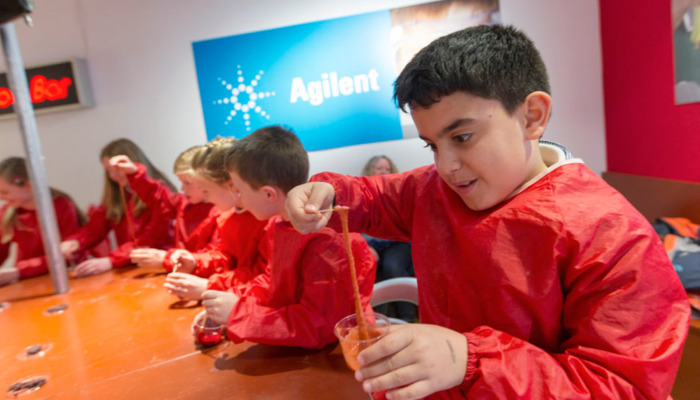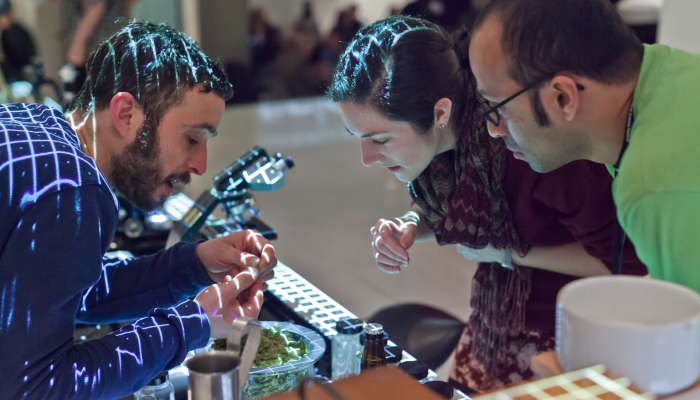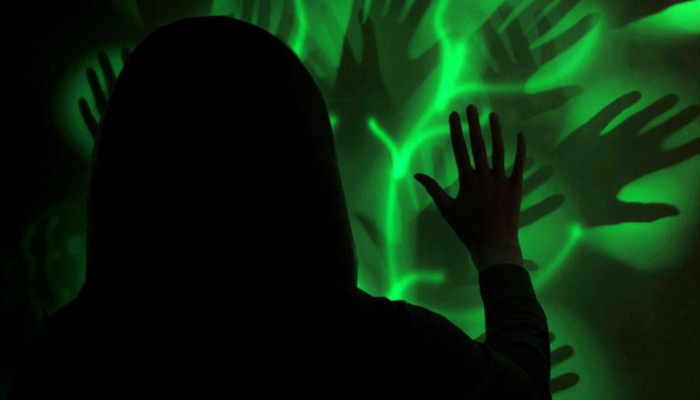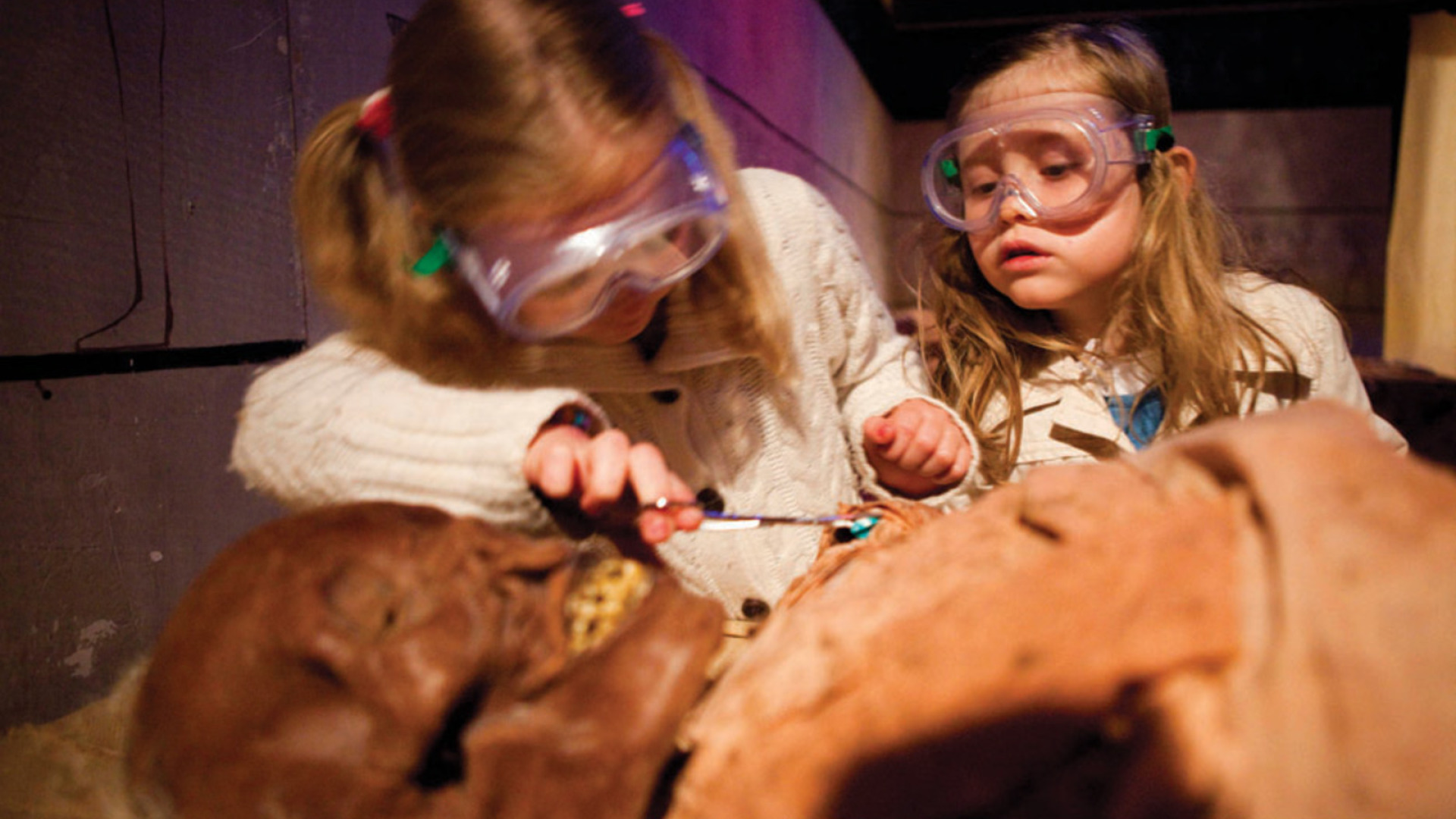What makes the Edinburgh Science Festival so special?
The Edinburgh Science Festival was the world's first such festival when it launched in 1989. Today it remains the UK’s largest Science Festival and for 2 weeks each year - centred around the Easter break - offers a range of amazing experiences for all ages, with a programme of exhibitions, events, workshops, performances, screenings and discussions in venues across the city. The next festival [4 to 19 April 2026] has the theme is Going Global, showcasing the research and innovation created through international partnerships that address shared challenges, directly aligning with the UN Sustainable Development Goals (SDGs). So what makes the Festival so special?
1. There's lots of family fun

At the heart of the programme is Science Festival Favourites, a selection of our best-loved immersive workshops and hands-on activities, including:
- Children can Dig Up a Dinosaur (ages 5+) in a special dig site and discover all about the creatures which ruled the Earth millions of years ago, become a forensic scientist in CSI: Crime Scene Investigation (8+), help solve a crime and catch the perpetrator or get their goo on in Splat-tastic! (5+), be creative with chemistry and make their very own slime to take home.
- Also part of Science Festival Favourites, the whole family can take part in Mini-Medics: The Body Show (7+), inviting everyone to scrub up, don their masks and join Doctor Watson and Nurse It-Better as they explore the human body and how to keep it healthy. The Rocket Show (7+) makes the rocket science fun and accessible as children explore forces, test materials and prepare for a launch of a rocket fit for space.
- Tech Decoded, supported by the Association for Science and Discovery Centres and SeaByte, features free drop-in activities that allow families to explore technology from AI to coding. Visitors will learn how the internet works and have the chance to create their own electrical circuits.
- and join us at Edinburgh Zoo for an Easter Egg-splorer Trail where, if you complete the trail you win a prize; while An Egg Hunt Across the Ages at Dynamic Earth will take you on a travel through time across our exhibition to find out all about different kinds of eggs and the creatures that lay them - from corals and dinosaurs, to penguins and catsharks.
2. And sociable science for the adults

As in every year, Edinburgh Science Festival produces a range of entertaining science events with a twist for adults, including:
- In Bake It Global [8 April] two of 'Great British Bake Off' stars take us on a mouth-watering, science-fuelled tour of Scotland’s iconic exports. Dr Josh Smalley, 2023 finalist and science communicator, teams up with Edinburgh’s own Peter Sawkins, 2020 winner, to delve into the science behind whisky, salmon, raspberries, and more. Expect interactive demos, live bakes, and a festival-packed experience that shows just how Scotland’s flavours go global!
- Experience a mesmeric and immersive show with breath taking views of the Solar System, set to the Pink Floyd's Dark Side of the Moon [9 to 19 April] in spectacular surround sound. Over half a century after its launch in a planetarium, this truly is a unique way to experience this iconic album.
- Join psychology and human–animal interaction experts in Why We Love Our Pets [6 April] for an evening uncovering the science behind our love for pets. Through surprising insights, stories, and interactive moments, you’ll walk away with a deeper understanding of the joy and health our furry friends bring.
- In our workshop (AI) Life Begins at 50 designed especially for adults aged 50 and over, you'll be introduced to the latest AI technology in a clear, hands-on way. Enjoy fun games, interactive activities, and real conversations about how AI can support everyday life.
3. While we also tackle the Big Ideas
With major issues of societal and planetary importance a continuing focus for the Festival, this year features an inspiring line-up of speakers and events including:
- The Festival begins with our Opening Gala: First Women of Science where a panel hosted by former First Minister Nicola Sturgeon and including Astronomer Royal for Scotland Prof Catherine Heymans plus author of The Edinburgh Seven Janey Jones, will discuss what it truly means to be the heard voices in a history of hidden voices
- In How to Fix the Climate Crisis [6 April], Prof Tim Lenton - the scientist who first identified climate tipping points - takes an optimistic look at how we can all play a part in triggering positive tipping points to avoid the worst dangers to our future climate.
- The Future of Water [7 April] will blend real-world stories with hopeful possibilities in this exciting exploration of how we can work more in-tune with nature to restore balance, build resilient communities, and rethink our relationship with water and the natural worlds.
- Award-winning broadcaster and expert medical journalist Dr Deborah Cohen presents an urgent and thought-provoking examination of the way healthcare is being shaped by social media, the role of big tech in modern medicine, and the commodification of our health, in How the Internet Hijacked Our Health [11 April]
- And we’ll help you navigate the new frontier of video, image and language generation in our interactive workshop Truth, Trust and Trickery in the AI Age [15 April] where you’ll learn from the BBC Blue Room about the latest tools and techniques and tackle dilemmas as a journalist in our pop-up newsroom.
- Each year, The Edinburgh Medal is presented to those who have made a significant contribution to the wellbeing and understanding of humanity through the sciences. This year’s recipient is the Kay Redfield Jamison, world renowned clinical psychologist - and her Edinburgh Medal Address [13 April] will share insights into her reshaping of global perspectives on mood disorders and their treatment, reducing stigma and expanding public understanding of mental illness.
4. And explore the connections between Science and Art

Each year the Edinburgh Science Festival commissions or exhbiits artists who work in the grey space between art and science, exploring the connections that many do not see and helping us to look at science in a different way:
- For the 2026 festival artist Gayle Chong Kwan has been commissioned to creat a new art installation, 'The Great Instauration', hosted in the Grand Gallery of the National Museum of Scotland - and an Artist Tour [17 April], Gayle will discuss how contemporary art can operate as a site for inquiry, bridging scientific thinking and creative practice, and opening up new ways of understanding our relationships to place, environment, and knowledge production.
- Space Journal: The Arts and Science of Cosmic Exploration [11 April] is a visual celebration of our perception of the cosmos, and our efforts to reach it, from the seventeenth century to the present day. Presenter, science writer and podcaster Dallas Campbell weaves together priceless archival memorabilia, revolutionary experiments and spectacular scenes to map both real and potential encounters with our celestial backyard.
- Join us at Modern Alchemy [16 April] for an evening conversation between artist Susan Aldworth and scientist Dr Amanda Jarvis, hosted by Edinburgh Printmakers. We will discuss their collaborative experience, the overlaps between scientific and artistic process, and how sustainability shapes both research and art.
- Sphaerosymphony [16 April] transforms real-time air quality data from cities around the world into an immersive visual and musical experience. A dynamic 3D sphere glows, pulses, and resonates in response to measured atmospheric changes. Presented by creative technologist David Oxley and Piera Morlacchi, Associate Professor at The University of Edinburgh, this evening blends science, art, and imagination.
- Between Glass and Magnetic Fields is an interactive talk, accompanying an art installation by Gregory Alliss, emerging from his time as Creator in Residence for STEAM Imaging VI: Resonant Connections through Design and Data, at the Fraunhofer MEVIS Institute for Digital Medicine.
5. With lots of events around the city
Besides the core festival venues at National Musuem of Scotland, Dynamic Earth and Royal Botanic Gardens, you can find amazing experiences across the city region:
- the Usher hosts two major events: Hamza Yassin's Adventures in Nature [12 April] will see the famed wildlife cameraman, author and TV presenter in conversation with science presenter Siân Bevan; and in An Evening with Helen Sharman [12 April] we'll hear the first British astronaut's unique, personal experiences from her historic 1991 mission aboard the Mir space station
- in the McEwan Hall at the University of Edinburgh, we'll celebrate the extraordinary life and legacy of Jane Goodall, PhD, DBE – Founder of the Jane Goodall Institute and UN Messenger of Peace – whose groundbreaking research and community-led conservation work transformed our understanding of chimpanzees and the natural world.
- discover Edinburgh’s storied history of theoretical physics in a walking tour from Old College Quad that will guide you through the nooks and crannies of beautiful Edinburgh, highlighting places associated with extraordinary physicists who have called the Scottish capital home.
- Viist the SS Explorer which was the UK’s very last steam sidewinder trawler and also the last steam ship to be registered in Leith, where she now resides, to learn about her crucial role in the development of our fishing industry technology and our understanding of the seas and their ecosystems.
- travel out of the city to see The Rocks of Roslin which once provided limestone for agriculture, stone for building and coal for power. They were formed in huge tropical swamps, where rivers meandered towards a distant sea to the west. Come along and see the record of past warmer climates, in a landscape formed by ice in some of the coldest conditions the Earth has known
